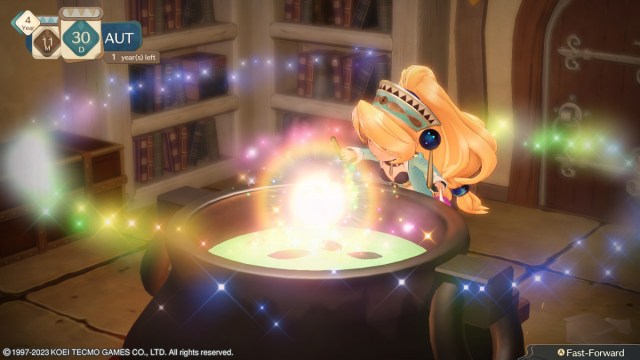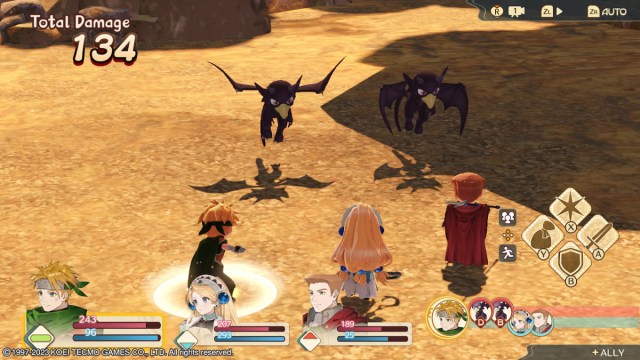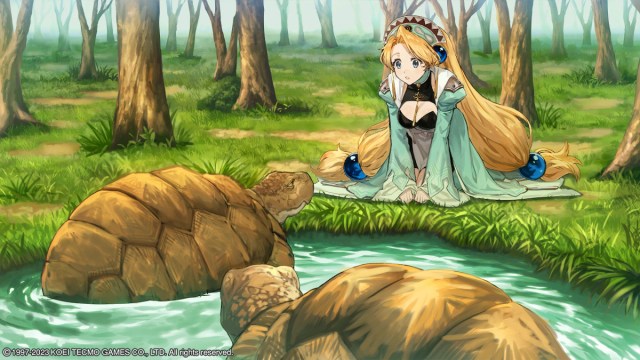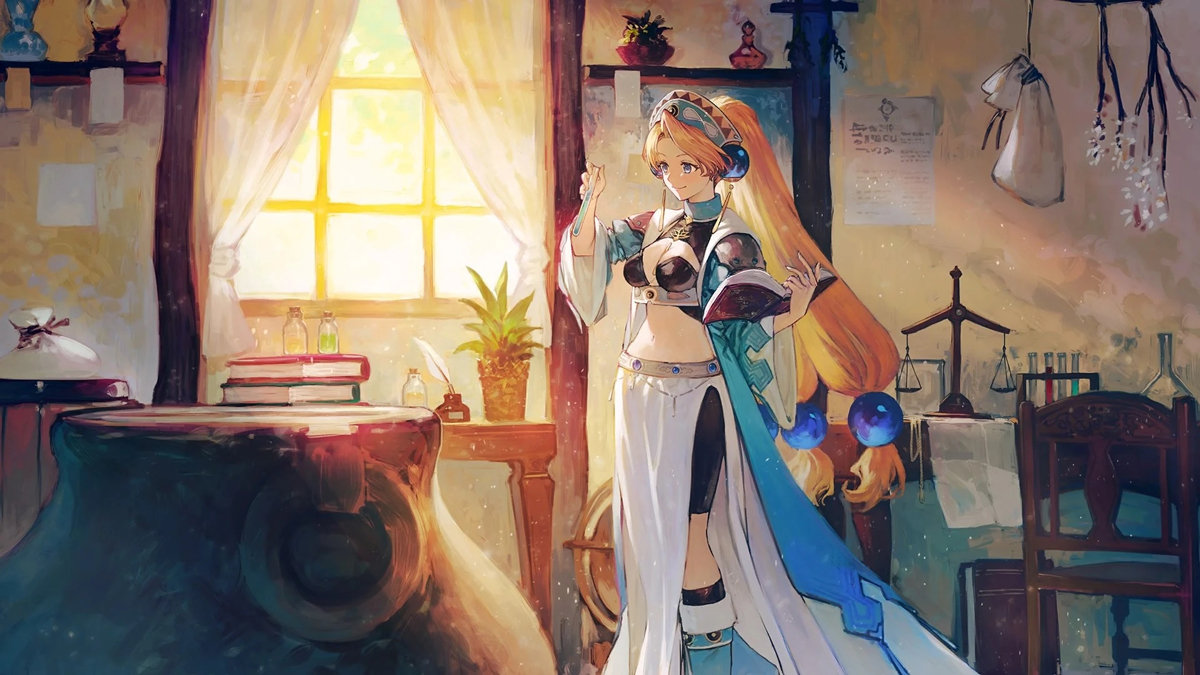Otherwise, it’s a rather jolly time
It has taken a while, but Koei Tecmo and Gust’s long-running Atelier series is finally clicking with a broader audience.
The Ryza trilogy has resonated in a way no prior games have. Whether it’s the changes to the combat, the toned-down magical girl aesthetics, or Gust discovering all we ever wanted were some thicc thighs, the future is promising for this still-pretty-niche-but-not-as-niche-as-it-used-to-be franchise. I’m sure we’ll find out in the next couple of months what the next new Atelier game will be. In the meantime, we can return to where it all started with Atelier Marie Remake: The Alchemist of Salburg.
My history with the Atelier series is rather short. Like a lot of people, Atelier Ryza served as my proper introduction, though I did previously dabble with the mobile game and Atelier Annie: Alchemists of Sera Island for the Nintendo DS. Though I was only able to put about 10 hours into the game before having to move on, my adoration for Ever Darkness & the Secret Hideout piqued my interest in the rest of the Atelier franchise. While I don’t think I’ll go back to play any of the previously released games that were ported to Switch, partially on account of how they never seem to go on sale, I did make sure to set aside time for the Atelier Marie Remake.
And I’m glad I did. Atelier Marie Remake: The Alchemist of Salburg is a delightfully laid-back crafting RPG where time is of the essence. You play as Marlone—Marie for short—as she embarks on a five-year quest to prove herself a worthy alchemist. Her teacher, Ingrid, sets her up with an alchemy shop in town and tasks her with creating an impressive item. That’s all there is to the set-up of this game. From there, it’s up to you to decide how Marie will spend each day of the year.
Unlike the Story of Seasons franchise, Atelier Marie doesn’t condense in any way. You have five full calendar years to finish the job, but time moves way faster than you might think. Pretty much everything you do moves time forward. Gathering supplies costs a day. Collecting your spoils after a battle also ticks another day off the calendar. Traveling from town to one of the locations around the map can take up to a week. Practicing alchemy can cost anywhere between one day and several weeks, depending on the rarity of the item you’re creating. And if you need to create other items before you can make your targeted item, don’t be surprised if an entire season passes you by. Near the end of my first run, I lost all of autumn and a little bit of winter trying to craft a single item.
There are a few things that don’t cross out days on the calendar. You’re free to explore the tiny town of Salburg, including checking out the tavern for requests and rumors, visiting the weapon shop, going to the academy to bone up on Marie’s education, or attempting to get into the castle. There is also a diorama mode in the Hall of Memories and an easy-access photo mode. I was excited to take pictures in this game, given how beautiful it looked in trailers. While it’s still lovely on my Switch, it’s also too damn bright.

Bloom lighting is alive and well in the Schigsal Kingdom. This place hasn’t known an overcast day in its life, with each season experiencing incredibly bright days that can look almost blinding on a Switch OLED. Winter, in particular, looks so bright I worried my transitional glasses would darken if I stared for too long. It’s a shame the lighting is so overwhelming here because the art direction is quite good. It reminds me somewhat of what Nintendo and Grezzo were going for with the remake of The Legend of Zelda: Link’s Awakening, but with a stable framerate.
It’s not only the lighting that picks away at the stunning nature of the art direction. In battle, everything moves so quickly that I never really got to enjoy the designs of the combat areas. With toned-down lighting and an easing up on the speed of battle, I could have appreciated the look of this world a bit more than I did.
Speaking of battles, they’re straightforward turn-based affairs. Marie can recruit party members around town, each with unique weapons, skills, fees, and side stories to invest in. I got through most of the game with Hallesch and Ruven at my side, though I eventually swapped out the latter for Kirielich as her special attack was far more useful for some of the later battles. The more you battle with your companions, the stronger your bonds with them will be, leading to short story events that flesh out their motivations.
Nothing here is too hard-hitting or in-depth, but I must credit the translation team for creating a cast this well-written. Especially for Marie. After reading Koei Tecmo describe her as “careless,” I was sure she’d fall into an annoying character trope. Fortunately, she never does. The game doesn’t play up her lack of student excellence as her being some sort of dummy, but rather a person who learns better outside of a classroom. It’s a great direction to go with the character, and I’m glad my expectations were so pleasantly subverted.

Due to the player-driven nature of Atelier Marie, there are a lot of story moments and events I missed. Maybe I was rushing too much, but I never experienced aspects like the Martial Tournament and the King’s Birthday. I believe the game shares some of the blame here thanks to the random nature of how some things unlock. For instance, to access new areas for gathering and battling, you need to purchase rumors at the tavern. There is no set order in which you unlock these locations, and one of the first areas I unlocked was marked for level 20 and above. It would be several more hours before I could safely visit it. Meanwhile, the final area I unlocked was marked for level 10 and above. By the time that finally became available to me, I’d already gotten Marie up to level 36.
As for the different events you can experience, the game does include a handy list and how to unlock them. But because the menus are so unintuitive, I kept forgetting about it. The menu system here is not as streamlined as it needs to be, with everything split between two cumbersome interfaces. I also couldn’t find a useful calendar, something that significantly help me better plan my time with the game. As lousy as the menus are, they didn’t deter me from playing.

It was easy for me to lose hours every night this past week with Atelier Marie. The gameplay loop of gathering and crafting is incredibly satisfying, and this is coming from someone who generally hates crafting. Maybe it’s the non-confrontational gameplay or that everything moves at a good clip, but I never felt bored of it. I didn’t think this game would devour all my primetime television hours, but that’s exactly what it did. And I think the fact that there is a time limit is part of the reason for that.
Five in-game years sounds like a long time, but you can complete Atelier Marie in less than ten hours. That is short enough that I have no problem giving it a second run. While some might consider an arbitrary timer an outdated design choice, I’d like to see more games bring it back. Pikmin 2 and 3 are great, but neither gives me the same sense of accomplishment as beating the clock in the original Pikmin. Atelier Marie Remake does include an unlimited mode that drops the five-year limit—as well as some in-game events—but I don’t think I’ll ever bother with it. The original concept works, and I encourage anyone who’s picking this up to give it a go in its original form at least once before ditching the time limit.
Atelier Marie Remake: The Alchemist of Salburg offers a rather simple experience, but I thoroughly enjoyed it. As somebody who constantly struggles to find time to game these days, I feel delighted to see short, succinct RPG experiences like this out there. While I wasn’t able to see enough to give this game a proper review, I’ve played enough to recommend it to anyone who might be curious about the origins of this franchise.
Atelier Marie Remake: The Alchemist of Salburg releases on July 13, 2023, for Nintendo Switch, Steam, PlayStation 4, and PlayStation 5.
[This impressions piece is based on a retail build of the game provided by the publisher.]








